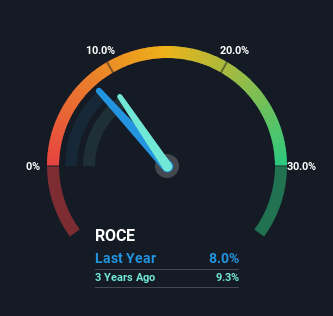Some Investors May Be Worried About Macquarie Technology Group's (ASX:MAQ) Returns On Capital
If you're not sure where to start when looking for the next multi-bagger, there are a few key trends you should keep an eye out for. One common approach is to try and find a company with returns on capital employed (ROCE) that are increasing, in conjunction with a growing amount of capital employed. If you see this, it typically means it's a company with a great business model and plenty of profitable reinvestment opportunities. In light of that, when we looked at Macquarie Technology Group (ASX:MAQ) and its ROCE trend, we weren't exactly thrilled.
Return On Capital Employed (ROCE): What Is It?
If you haven't worked with ROCE before, it measures the 'return' (pre-tax profit) a company generates from capital employed in its business. To calculate this metric for Macquarie Technology Group, this is the formula:
Return on Capital Employed = Earnings Before Interest and Tax (EBIT) ÷ (Total Assets - Current Liabilities)
0.08 = AU$38m ÷ (AU$541m - AU$63m) (Based on the trailing twelve months to June 2023).
Therefore, Macquarie Technology Group has an ROCE of 8.0%. Ultimately, that's a low return and it under-performs the IT industry average of 16%.
Check out our latest analysis for Macquarie Technology Group

Above you can see how the current ROCE for Macquarie Technology Group compares to its prior returns on capital, but there's only so much you can tell from the past. If you'd like to see what analysts are forecasting going forward, you should check out our free report for Macquarie Technology Group.
What Can We Tell From Macquarie Technology Group's ROCE Trend?
In terms of Macquarie Technology Group's historical ROCE movements, the trend isn't fantastic. Over the last five years, returns on capital have decreased to 8.0% from 24% five years ago. Although, given both revenue and the amount of assets employed in the business have increased, it could suggest the company is investing in growth, and the extra capital has led to a short-term reduction in ROCE. And if the increased capital generates additional returns, the business, and thus shareholders, will benefit in the long run.
On a side note, Macquarie Technology Group has done well to pay down its current liabilities to 12% of total assets. So we could link some of this to the decrease in ROCE. Effectively this means their suppliers or short-term creditors are funding less of the business, which reduces some elements of risk. Some would claim this reduces the business' efficiency at generating ROCE since it is now funding more of the operations with its own money.
Our Take On Macquarie Technology Group's ROCE
While returns have fallen for Macquarie Technology Group in recent times, we're encouraged to see that sales are growing and that the business is reinvesting in its operations. And long term investors must be optimistic going forward because the stock has returned a huge 215% to shareholders in the last five years. So while the underlying trends could already be accounted for by investors, we still think this stock is worth looking into further.
On a separate note, we've found 1 warning sign for Macquarie Technology Group you'll probably want to know about.
While Macquarie Technology Group may not currently earn the highest returns, we've compiled a list of companies that currently earn more than 25% return on equity. Check out this free list here.
New: Manage All Your Stock Portfolios in One Place
We've created the ultimate portfolio companion for stock investors, and it's free.
• Connect an unlimited number of Portfolios and see your total in one currency
• Be alerted to new Warning Signs or Risks via email or mobile
• Track the Fair Value of your stocks
Have feedback on this article? Concerned about the content? Get in touch with us directly. Alternatively, email editorial-team (at) simplywallst.com.
This article by Simply Wall St is general in nature. We provide commentary based on historical data and analyst forecasts only using an unbiased methodology and our articles are not intended to be financial advice. It does not constitute a recommendation to buy or sell any stock, and does not take account of your objectives, or your financial situation. We aim to bring you long-term focused analysis driven by fundamental data. Note that our analysis may not factor in the latest price-sensitive company announcements or qualitative material. Simply Wall St has no position in any stocks mentioned.
About ASX:MAQ
Macquarie Technology Group
Provides telecommunication, cloud computing, cybersecurity, and data center services to corporate and government customers in Australia.
Excellent balance sheet with acceptable track record.
Similar Companies
Market Insights
Community Narratives



